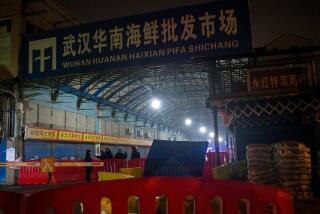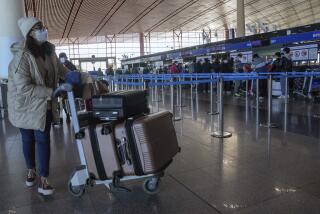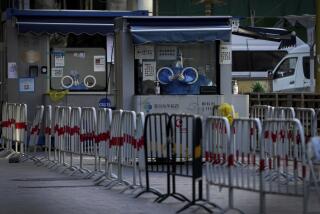Op-Ed: I had a ringside seat for the SARS virus in 2003. Here’s how this coronavirus is different
- Share via
In my early days of living in Beijing in the fall of 2002, I found a cheap way to improve my Chinese: riding in a taxi for hours each night so I could chat with the drivers, who offered an inexpensive master class in regional dialects. One night that December, as a cab dropped me off at my apartment, I was in a delirious haze. Soon the coughing began. I slept more than I was awake, always with a feverish dream.
I checked into a hospital. The doctors said that X-rays showed my lungs were badly occluded. The usual treatment of steroids failed to help much. I wanted to go back to the U.S., but the doctors said it wouldn’t be wise to travel.
Within a week I began to recover my strength. Two weeks later, I was in New York, and Beijing was grappling with the first wave of severe acute respiratory syndrome, or SARS, infections. That summer, I received a polite email from the hospital where I had been treated: They were collecting data on all cases of “atypical pneumonia” — like the sort that had stricken me, an otherwise healthy 34-year-old — in the earliest weeks of SARS. Would I like to be tested?
Living in Beijing during SARS — and for more than a decade afterward — has put a sharp edge on the sensations of this strange moment, when another new coronavirus is sickening thousands of people.
What is apparent first is the ways in which China has changed since 2003. The mass mobilization of millions of people, the enterprises fired up like a single machine to make badly needed products, the transport planes full of military doctors and nurses with experience treating SARS and other viruses. All this is new.
To watch a few minutes of Chinese TV news each night or scroll through my Douyin short-video feed (also unimaginable in 2003) offers a sort of transport, a sci-fi leap into a white jumpsuited, mask-wearing nation on a war footing. Young nurses post videos of themselves cutting off their hair so they can fit into containment suits for 20-hour shifts. The president, touring the capital, gets his temperature checked dutifully at each stop. Parents wait outside in cold lines with coughing children.
When you see the human scale and fearful speed of the national reaction in China, two things linger longest in mind. First, the coronavirus of 2020 will be a defining event in the Chinese popular, political and social consciousness. In this it resembles 2008, when China had to manage the Summer Olympics and then, immediately, a shocking global financial crisis. China will see herself differently after this; so will the world. Much like 9/11 in the U.S., this is an event that will color the mental landscape of a generation.
There’s a second thing you can’t help wondering as you watch: What if this outbreak had occurred in Houston? Would we have quarantined the city? Limited travel? Forced people to have their temperatures checked twice a day?
This isn’t an abstract question. Not because the coronavirus is going to arrive at scale in the U.S. soon — it’s too early to know whether that will happen — but because we all live now in an age of high-speed connected networks we barely understand and struggle to manage. And contagions are a feature of this new world. Fake news, fear, nationalism and disease spread faster than ever now.
In 2015, writing in the New England Journal of Medicine, Bill Gates warned that “of all the things that could kill more than 10 million people around the world, the most likely is an epidemic.” And, he observed, we’re not prepared.
What’s really playing out in China and the world now is not just the human story of a medical epidemic. It’s also a chapter in our generation’s defining struggle with the unnerving perils of a connected age. The Cold War era was one of isolation. The Age of Globalization that followed envisioned simple, easy, hopeful connections. Our new age, though, is one of competing demands: between privacy and constant connection. The coronavirus is a test. And not just for China.
I never took that blood screening the hospital proposed to see if I have SARS antibodies. Watching this new epidemic has made me want to go do so, out of a sense of sympathy and maybe a feeling, too, of curiosity.
Adam Smith observed in 1759 that even a sympathetic European would be more disturbed by the loss of his little finger than by the destruction of China in an earthquake. But in our connected age? Your earthquake is my earthquake. Your virus is my virus. So, as tempting as it is to unplug, to put up walls, to “decouple” from other nations or whip up old racist tropes, this is exactly what we must not do. The problems we face and that the Chinese face today are really the same problem: how to cope with the murderous demands of our complex, networked new world.
Ramo is co-chief executive and vice chairman of Kissinger Associates. He is the author of “The Seventh Sense: Power, Fortune and Survival in the Age of Networks.”
More to Read
A cure for the common opinion
Get thought-provoking perspectives with our weekly newsletter.
You may occasionally receive promotional content from the Los Angeles Times.










